Cologne 2-Barcelona 1
In Autumn 2024, Extant was invited to present at two international European events, Un-Label’s Creative Lab in ‘Aesthetics of Access in Practice’ Cologne, Germany, and Àfora-Focus ‘II International Congress of Spectators’, Barcelona, Spain. While both events were very different, (fruit analogies come to mind) having their own motivations and available resources, there were some valuable take-aways from the oranges and apples stall in terms of juicy learnings regarding ‘inclusion’.
Cologne
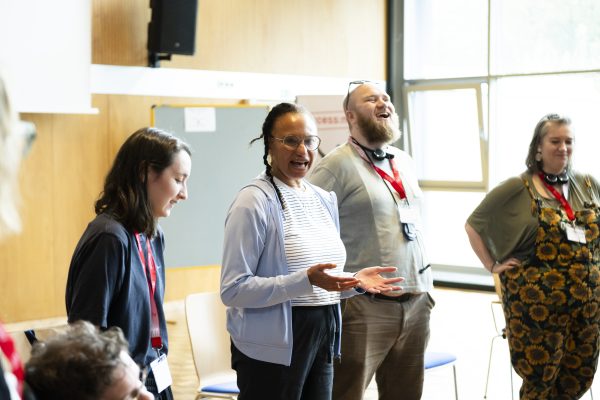
© Un-Label, Creative Lab 2024, Germany, Photographer: Annette Etges.
On 15th October, Ben Wilson, former Extant Trainee Artistic Director, Ellen Jupp, Extant Administrator and Project Coordinator and myself, took the Eurostar from London to Cologne. We were to participate for the next three days in an event described by the organisers, Un-Label, as ‘For all those who (want to) work artistically with Aesthetics of Access in practice, this creative lab will be an absolute highlight!’ The lab took place in a purpose-built centre called ‘The Academy of Cultural Education’ a contemporary sprawling site, isolated within a forest in an area called Remscheid, about an hour’s drive outside of Cologne. We were joined by other UK disabled artists including Nickie Miles-Wildin and Helen Bryer and Adam Smith from Access All Areas to facilitate for 25 ‘artists and cultural workers from theatre and dance venues and the independent scene’ who attended from across Germany.
We all ran full day workshops offering our perspectives and working methodologies around inclusive access within performance and gave presentations on how we have worked with the aesthetics of access in our own practice. The participants who already had basic knowledge and/or their own experience in access and accessibility also presented their own projects as case-studies for discussion in sessions facilitated by each UK disabled artist. In these sessions we offered advice and support regarding their ideas on developing creative access for these projects and this was one of the highlights of the lab. The level of interaction and complexity engaged with, not only about the creative and access process, but also the challenges on producing something such as a touring punk opera at mid-scale level in another European country, was fascinating to learn about and advise on.
Another highlight, apart from generally hanging out with other disabled artists that we don’t get enough opportunity to do, was the luxury of running a full day workshop with genuinely engaged participants. In the Extant session, Ben and I took the group on a journey that included exercises on constructing the identity of a ‘blind’ person from the social and mainly ableist cultural references out there, how to run an accessible rehearsal room when working with visually impaired people and facilitating a long-form exercise where different types of audio access were gradually built up.
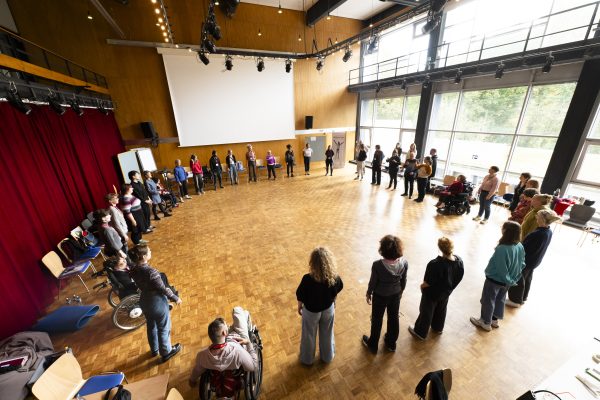
© Un-Label, Creative Lab 2024, Germany, Photographer: Annette Etges.
The remote and slightly institutionalised location meant that apart from our group and a youth hip-hop camp sharing the same building with us, there was little by the way of other cultural offerings during our 3 day stay. The venue itself was a topological labyrinth, which although accessible to some, would have benefitted from some indoor way-finding navigation to help its visually impaired inmates find their way around. Apart from this, the reception, awareness and care given by the hosts was at such a high standard, during the lead up with regards to communication, technical, preparation, remuneration, and then generally fostering an inclusive culture throughout, including great live interpretation for all; something born of disability representation in the leadership of a team like Un-Label who are dedicated to developing an authentic diverse culture.
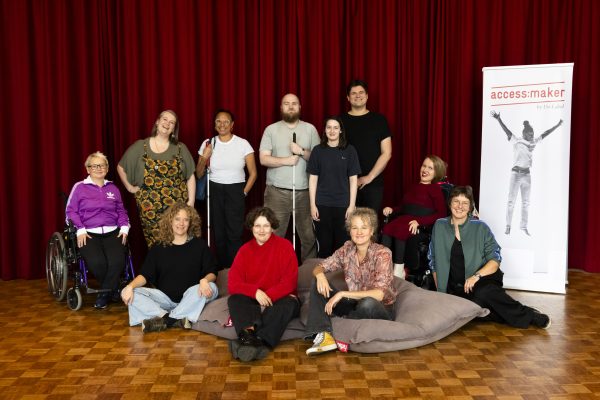
© Un-Label, Creative Lab 2024, Germany, Photographer: Annette Etges.
Barcelona
On 17th November I flew to Barcelona with an access worker to attend the ‘II International Congress of Theatre Spectators’ that they describe as ‘This is not another congress about the audiences. It is the only international meeting of, by, and for theatre spectators, who are art and part. A unique opportunity to learn first-hand the needs, desires, concerns, and beliefs of performing arts spectators.’
In September, Extant had learnt we were selected from their application process as one of 50 international delegates who were to contribute to this event. What wasn’t so clear was that we were not required to present on what we had submitted in our application (an abstract on visually impaired audience engagement with immersive theatre), but instead, in the six weeks leading up to the event we found that we were expected to spend an hour each week attending online sessions with a group of other delegates who we had been matched to; in our case ‘access and inclusion’. The online ‘Google Meet’ sessions were aimed for each group to design over the six or so weeks, a panel provocation around a different perspective on ‘theatre spectatorship’. A nice idea, fostering democratic shaping and engagement, however as the members of my group were all Spanish with varying degrees of English and me with no Spanish and no interpreter, this expectation quickly unravelled.
I arrived in Barcelona with only a vague notion of what our panel was going to cover but had come prepared with a drafted presentation on the original submission proposal and had sent the audio-visual (AV) files in advance to the organisers to avoid finding myself high and dry. The only experience of this at the start was the high-end hotel on La Rambla where we were staying, and a chilled glass of dry cava to welcome us as we arrived. With its roof-top swimming pool terrace and being 5 minutes’ walk from the theatre where the congress was to take place, and a similar distance to the local Catalan restaurants where our meals were provided, it meant we were cocooned in the bosom of Barcelona’s bustling street and cultural life.
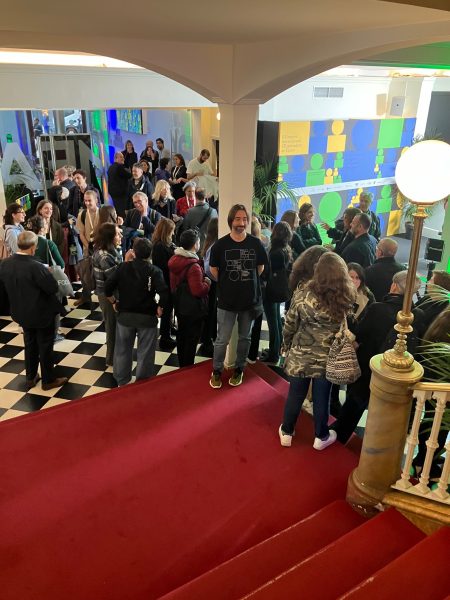
II International Congress of Spectators, Barcelona 2024
The first day of the congress was charged with excitement as all the delegates from 25 countries convened for the launch and it opened with a speech from the CEO of Àfora-Focus who had funded this 300,000 Euro event to apparently ‘give something back from commercial theatre to the wider industry.’ It wasn’t possible to be absolutely sure of the exact translation as the interpreter was an AI software interface in our headphones that we endured over the 3 days with its delays, glitches, random exclamations and blanding out of speeches, panel presentations and Q/A interactions. This, over a five-hour period, which some of the sessions ran to, made things sometimes hard to follow. It was also hard, among the throng of delegates, to gather all the members of our ‘inclusion’ panel together until just before we were about to present on stage, on the second morning of the congress. From what I’d experienced of the other panels so far, it felt that we might not perhaps cohere in the same way because of this, but as the other members of my group seemed relaxed about it, I went with the flow… until the technical manager backstage announced 5 minutes before our panel start time, that they didn’t have Extant’s AV ready, so wouldn’t be showing it. I announced then that I wouldn’t be going on unless our work was presented on the same level as the others in my group whose AV was going to be included. This caused a delay in the slick production schedule, which the organisers were unhappy about, (rolling their eyes apparently) but for the sake of true inclusivity, I felt that this delay was a small price to pay. Not for my other non-disabled panel members alas, there to present on disability access and inclusion, and who didn’t appreciate the delay and didn’t hide their irritation. However, the tactic worked, and the Extant AV was sorted out and when cued, I joined the others to appear on a more level presenting field.
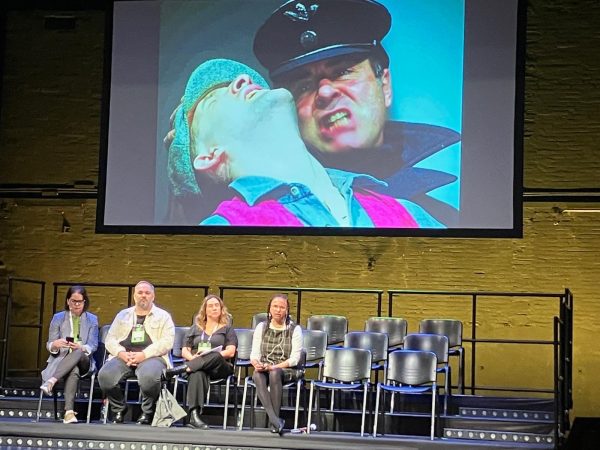
II International Congress of Spectators, Barcelona 2024
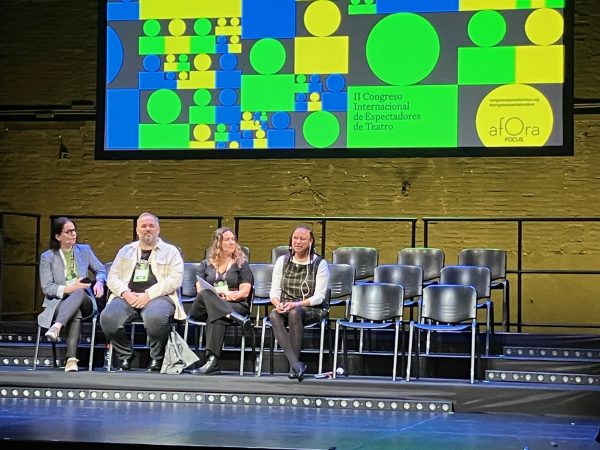
II International Congress of Spectators, Barcelona 2024
When it came to my turn, I gave a self-description to the congress, explained the rationale for doing so, the problematics with ‘spectatorism’, and how Extant decolonises this in our work, giving the example of Flatland where the subject of audience and performer become one, erasing the gaze in between.
The short audio described video of this that was shown elicited a big round of applause and lots of interest and discussion with me and different delegates over the rest of the Congress. So, it had been worth troubling the ableism and poor organisation that challenged my full participation.
A video below of Maria’s presentation at II International Congress of Spectators:
In the end, as well as the fascinating formal presentations from theatre makers from countries such as Kape Verde, Singapore, Algeria, Ukraine, Lebanon, Ireland, Colombia etc, it’s the networking, chance conversations during coffee breaks, in hotel lobby and over dinner where the real congress happens and this event offered plenty of opportunity for this. It was, as the event organisers described, ‘unique’, however, it did leave some of us wondering, what was its real purpose? Maybe the 3rd International Congress, if it comes to it, might reveal the answer. In the meantime, the organisers, if they are genuine about really wanting to ‘learn’ as they professed was their desire as I arrived in Barcelona, could start with maybe consulting with an organisation such as Un-Label.
Maria Oshodi, Extant Artistic Director and CEO, January 2025